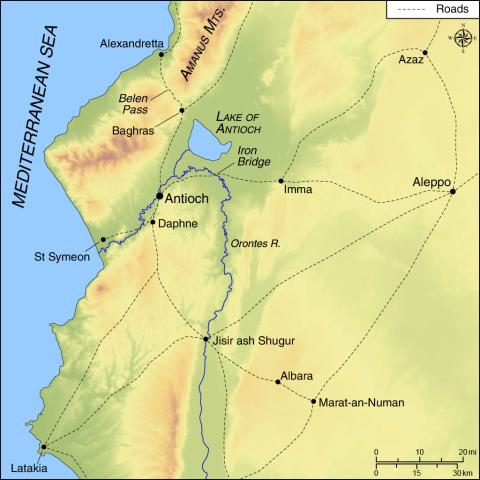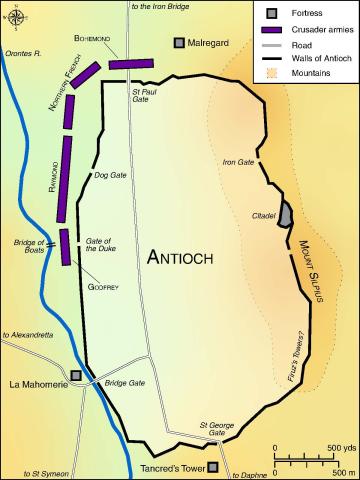The Crusaders Besiege Antioch
[5.12.3] Armēniī et Syriānī, quī erant intus in urbe, exeuntēs. et ostendentēs sē fūgēre, cotīdiē erant nōbīscum, sed eōrum uxōrēs in cīvitāte. Illī vērō ingeniōsē investīgābant nostrum esse nostramque quālitātem, referēbantque omnia hīs quī erant in urbe inclūsī. Postquam vērō Turcī fuērunt ēdoctī dē nostrā essentiā, coepērunt paulātim dē urbe exīre, nostrōs peregrīnōs undique coangustāre, nōn sōlum ex ūnā parte, sed undique erant latentēs obviam nōbīs ad mare et ad montānam.
[5.12.4] Erat autem nōn longē castrum, cui nōmen Aregh, ubi erant congregātī multī Turcī fortissimī, quī frequenter conturbābant nostrōs. Audientēs itaque nostrī seniōrēs tālia, nimis doluērunt, mīsēruntque ex mīlitibus suīs quī dīligenter explōrārent locum ubi erant Turcī. Repertō igitur locō ubi latēbant, nostrī mīlitēs, quī quaerēbant illōs, obviant eīs. At, nostrīs paulātim retrogredientibus ubi sciēbant Boamundum esse cum suō exercitū, statim fuērunt illīc mortuī duo ex nostrīs. Hoc audiēns Boamundus surrēxit cum suīs, ut fortissimus Chrīstī āthlēta, et barbarī irruērunt contrā illōs, eō quod nostrī erant paucī; tamen, simul iūnctī, iniērunt bellum. Mortuī sunt vērō multī ex nostrīs inimīcīs, et captī aliī ductī sunt ante portam urbis, ibique dēcollābantur, ut magis trīstēs fierent quī erant in urbe.
[5.12.5] Exībant quidem aliī dē cīvitāte, et ascendēbant in quandam portam, et sagittābant nōs, ita ut sagittae eōrum caderent in dominī Boamundī platēam; et ūna mulier occubuit ictū sagittae.
notes
(November 1097) Christian inhabitants of the city provide the Turkish garrison with useful intelligence. Turks based at an outpost called Aregh raid the crusaders, and ambush those sent to investigate. Bohemond comes to the rescue, and, though outnumbered, is victorious. Captured Turks are beheaded in sight of the city. The Turks shoot arrows at Bohemond's camp.
5.12.3
ostendentēs sē fūgēre: literally "showing that they were fleeing"; but they were really only pretending.
Illī: Illi picks up eorum.
nostrum esse: “our existence,” i.e., our nature; use of the infinitive as a substantive modified by a possessive adjective is CL, but colloquial.
undique erant latentēs obviam nōbīs: “wherever they could lay ambush for us” (Hill).
ad mare et ad montānam: "in the direction of the sea and of the mountain."
5.12.4
Aregh: Also referred to as Harem or Harim. It was about 25 km east of Antioch on the road to Aleppo.
quī dīligenter explōrārent locum ubi erant Turcī: the antecedent of quī is eos (understood); i.e., miserunt … eos qui … explorarent. Note that qui … explorarent is a relative clause of purpose. The leaders needed to know exactly where Aregh / Harem was.
quī quaerēbant illōs, obviant eīs: both illos and eis refer to the Turks in Aregh/Harem.
nostrīs paulātim retrogredientibus ubi sciēbant Boamundum esse cum suō exercitū: the crusaders were pretending to retreat and thus lead the Turks into an ambush.
iūnctī iniērunt bellum: “they joined battle in good order” (Hill).
5.12.5
in dominī Boamundī platēam: "into my lord Bohemond's camp" (Hill); platea in CL is "street, piazza."
ictū sagittae: ablative of cause.
vocabulary
5.12.3
coangustō (1): to confine in a narrow space (CL); to hem in, to attack (ML).
5.12.4
quaerō quaerere quaes(i)ī (quaesīvī) quaesītum: to search for, hunt for (OLD 1)
obviō (1): to act contrary to, go against (+ dat.)(CL); to attack (ML)
5.12.5
platae –ae, f.: street, plaza
occumbō occumbere occubuī: to fall, to die


